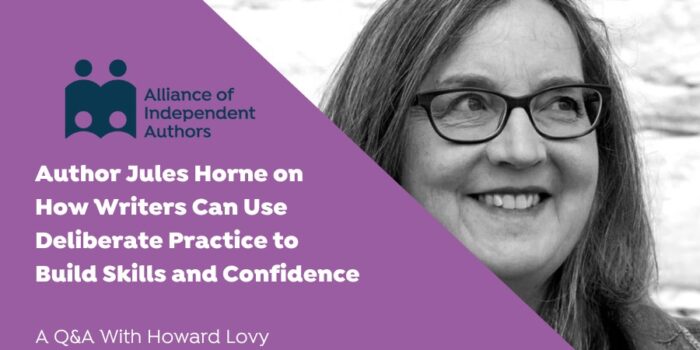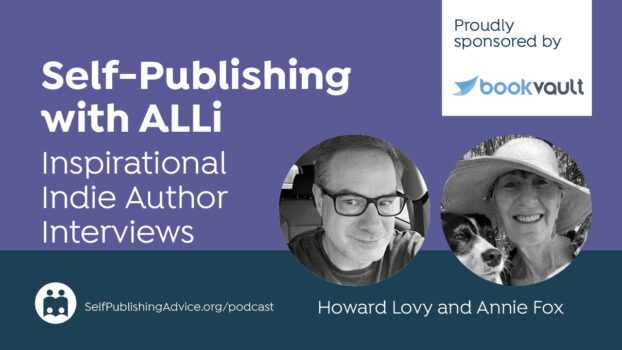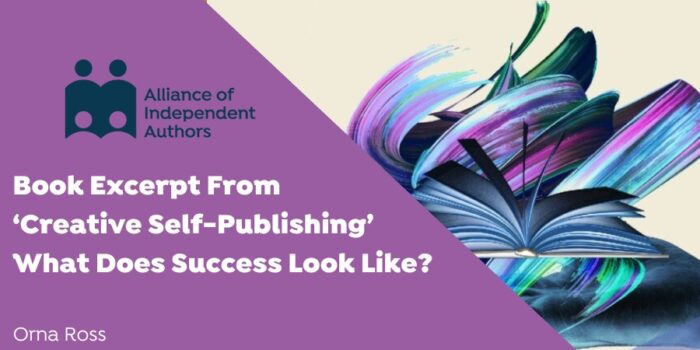Debbie Young, Commissioning Editor of the ALLi Author Advice Centre blog and advocate of ALLi's #Authors4Bookstores campaign, asks whether it's now time to drop the #selfpublishing tag, following her recent experience in a local bookstore.
Earlier this month, I decided to try to get my Christmas-themed book stocked by bookstores away from my home patch. I already have them stocked in shops where I'm a regular customer and have a longstanding relationship, but hadn't reached out beyond.
The perfect opportunity presented itself. I'd been invited to appear on Talking Books, a programme on community station 10Radio, 50 miles from where I live, and the presenter name-checked a local shop as a potential stockist, providing a helpful introduction. After a positive reception there, I was on a roll, and called in at two further shops on spec, one a small independent bookshop, the other a giftshop that had a small stock of seasonal books.
A Considered Approach
In the bookshop, the sole bookseller on duty was in the middle of serving a customer, so I waited for them to finish, looking appreciatively around the shop in the meantime.
After introducing myself politely, with a big smile, I told him about Stocking Fillers, emphasising the fact that it was currently being featured in regional media, so people might be looking out for it. I presented him with a free inspection copy, along with a professional-looking data sheet featuring the book's vital statistics such as bookseller discounts and availability. (Trade publishing companies, usually operating on much longer timescales than indies, call such things Advance Information sheets, but as this book's a year old, I think of it as a Bookseller Information sheet.)
I didn't ask him to order from me in person, not least because I can't cost-justify the time and petrol money to deliver supplies or to raise invoices for a handful of sales, but as stated on the sheet, he can order from his usual distributor. (This is because I publish via Ingram Spark as well as CreateSpace, in keeping with ALLi's recommendations.)
“Who is it published by?”
The bookseller took the book, clearly liked the look of the cover (recently shortlisted for CompletelyNovel's design award), and said “Who's it published by?” As I answered “a small local independent press”, he flipped it over and saw my “Hawkesbury Press” logo, and seemed happy with that. As its website makes clear, Hawkesbury Press is my own imprint, and most of its books are by me. To say “I'm self-published” when I've got an imprint emblazoned on the cover would have seemed odd, and my answer felt entirely natural and not at all dishonest. (I am, incidentally, very bad at lying, and will tell the truth even when it gets me into trouble.) The bookseller kept the sample book to examine at his leisure, and he will order more if he likes it. I left the shop feeling as if I'd won.
Post-Pitch Analysis
This speculative pitch cost me approximately £2 ( the cost of a copy of the book from the short print run I had done for publicity purposes plus a few pence for the information sheet, printed on my laser printer at home). I'd been passing by the shop anyway and had parked for free, so there were no travel costs.
What's the worst that can happen? The bookseller never orders any copies and throws the book in the bin, or gives it to the charity shop next door, and it raises a pound or two for the local hospice, which is fine by me. Best case, he orders more, puts them in his shop window and sells lots, which means I'll stand a good chance of getting him to take my next book, a collection of short stories on the theme of love and marriage, for his Valentine's Day display.
But my chief takeaway point was this: Was I wrong to drop the self-publishing tag? To me, that day, in that bookshop, it felt like the time had arrived.
OVER TO YOU How do you feel about calling yourself self-published these days? Or are we all indie authors now? (Subtle difference – see Orna Ross's defining post here!)
Is it time to drop the #selfpublishing tag? asks @DebbieYoungBN Share on X







It’s a shame that some authors want to hide from the fact that they are self-published. The concern is valid in that they don’t want to seem less legitimate, but the fact is that an author is an author and self-publishing is a wise choice to make for many authors.
[…] Is it Time to Drop the S-Word? by Debbie Young […]
An interesting question, Debbie. You are a publisher, whether you have published just one book, or millions. Who knows what will happen in the future? Debbie Young, the author, might go on to have a book published by a large traditional publisher, and Hawkesbury Press, the publisher, may go on to publish books by other authors. In my mind, the two types of business are separate – book authorship is one type of business and book publishing another and I think you were correct in the way you described the publisher. I agree we should drop the “self-publishing author” phrase as it has traditionally meant “author who had to resort to publishing their own book after it was rejected by many proper publishers”. This is no longer the case, book publishing is changing, but the old prejudice continues. Rather than being embarrassed, or afraid of prejudice, we should be proud of being both the author and the publisher of our books – after all, they both involve a lot of hard work.
Hi Yvonne. Yes, I think you’re right – we have a lot to be proud of, and those who aren’t familiar with what professional self-publishing requires us to do are often highly impressed when they take the trouble to find out! I also agree about the two things being separate – there is an overlap between being Debbie Young the author and Hawkesbury Press the publisher, but as a Venn diagram would show, there are lots of non-overlapping areas too. I have already published a few small, low-volume books for others under the Hawkesbury Press imprint, and I do plan to publish a lot more of my own books too. Publishing books for others is helpful in a way, in that it shows that HP isn’t just an ego-trip for me, but on the other hand, I’m responsible for their quality too, as a publisher, which if I published many more books for others would become a drain on my writing and self-publishing time. Always a balancing act, to which there’s no perfect solution, I fear!
[…] Debbie Young Debbie Young, Commissioning Editor of the ALLi Author Advice Centre blog and advocate of […]
Hi, I am the Canadian philanthropist who reads all of the AALi blogs and monetarily supports writers no matter their publishing choice – the only caveat – we insist on a high standard. The fact Debbie identified ‘Stocking Fillers’ was being featured by regional media would score high marks with a business minded bookseller. The more self-promoting the author has done the better- all about pre-sales & promotion when it comes to shelf space. Remember most booksellers are thinking unit sales per square foot not words per square foot. Then they take into consideration the reputation of their own brand (what type of quality book they want to be known to sell) At the end of the day the combination of an effective storyline, accurate editing, high quality printing and, catchy graphics plus pre-sales promotion will soften the steel heart of the bookseller and have them place the order. it will also draw my attention -the reader. Bravo Debbie for the foresight. I will personally be happy when the literary world can stop being concerned about the “s” word – just keep writing a great read and let your work speak for itself.
Merle, thank you so much for that thoughtful contribution, and for reminding us of the bookseller’s viewpoint: it’s about making the most sales per square foot of shelf space and building their own brand/reputation, not ours. Great to have you involved in our conversation here!
Hi, I am an Indie Author and I have a DBA but would rather not use it for my press name, or think I don’t want to at this time. So do I need to get another DBA or can I just make up a name for my press? Thanks for info!
HI Jacqueline, I understand DBA is the Amercian equivalent to “trading as” that we have here in the UK, where I have my imprint, and that DBAs are more complex than TAs here. I can’t advise you on how to proceed in legal terms, but you would do well to check out Helen Sedwick’s “Self-publisher’s Legal Handbook”, or to message her – she’s ALLi’s official legal advisor, based in the States, and hugely helpful and supportive.
I think what you did was absolutely fine, Debbie, and very professional.
I always try very hard to avoid the dreaded ‘s’ word.
It’s awful to admit, but when they ask who is the publisher, I feel a whisper or definite lowering of the voice when I say it’s self-published. Sometimes I say ‘SilverWood Books’ and they say they’ve never heard of them, and I have to go on and explain.
My book, Annie’s Story, is beautifully presented with a stunning cover so I can usually win them round (amazing what smiles and enthusiasm can do!, but in my opinion, I’m afraid self-pub books still carry a stigma because anyone can publish – and unfortunately, they do!
Thanks, Denise! Actually, I think having SilverWood’s imprint on your books’ spines is really helpful, (plus of course I know how professional all their books always look). And I do think name recognition of SilverWood is growing substantially, as they have published so many books now, so hopefully you won’t need to go on explaining for much longer!
I admire your approach, Debbie. I like how efficient you are re costs. I hadn’t though of a short run for ‘sample’ copies.
I’ve had a similar experience in local bookshops, but they want me to provide the copies directly, even though they’re available through their usual distributor as I went with Ingram Spark.
I also like your idea of the Bookseller Information Sheet.
Thanks for this helpful and hopeful post.
Thanks, Anne, glad to be of help. Several authors have told me lately that even though their books are available to order through the usual channels, their local bookshop prefers to deal with them directly, which I found surprising and counter-intuitive – but maybe it’s just that your local bookshop staff really like you visiting their shop and want to keep you coming in!
Or it may be that they just haven’t fully taken on board the fact that your books are available via Ingram, and are just assuming that they have to operate that way – another good reason to have an information sheet, spelling it out (because, after all, it is much more convenient for you if they order via their usual distributor too!)
A separate post with tips for producing an info sheet will follow soon…
Having been a successful ‘indi’ writer and publisher for many years in the health and care sector (and award-winning one) in the noughties, it’s interesting to see the differences and changes within the market I’m in now, children’s fiction – short stories.
There was no bar to buying resources straight from the writer/publisher by the NHS, Care Partnerships, awarding bodies, BFO, councils, care trusts etc. Nor was I ever asked about who the distributor was, as it was plain customers were buying from the producers, as they were from City and Guilds. Unlike now, I didn’t need to have a shop window to market them, but a lot of hard work identifying specific markets for products, being at conferences and networking events, developing the website (social media was in its infancy) And unlike now, resources retailed at much higher prices – and as we were innovative in our approach, there was nothing similar out there when we began.
But children’s fiction is vast and I’m competing in a completely different market. Especially as a short story writer (which I’ve been told more than once aren’t sellers) who’s self-publishing. I have revived Gizmo Publications as my imprint as I know people remember the name. I don’t have a logo yet – which does help branding – but am sing the cover and spine design in the same way as a logo.
When marketing to shops, outlets, libraries, museums etc, I do say I’m an indi publisher/author and proud of it – how did all the big publishers start if not as ‘indi’s? I also tell them they can buy through a distributor if they wish but that they get a personal service from me. My experience of Gizmo in the past tells me that this is a way to build relationships and repeat sales for new books – as well as developing word of mouth.
I haven’t managed to do any of the techno publishing stuff yet but I’m sure that’s another fruitful avenue for indi writers.
Lastly (honest!) I think we need to keep challengng the way indis are excluded from many opportunities. For example, Norhern Writing in the UK has a strand that places writers in libraries (I do a lot of storytelling in libraries and am commissioned to do so). When I asked at a recent event about indi writers being chosen, I was told its not done as:
– we need a track record (many of us have),
– we can’t afford to sell large numbers of copies at 50% discount (generalisation and maybe they should reduce the discount)
– generally we have no experience of presenting or working with children (sweeping statement) etc
There are few awards we can enter and as a short story writer, even fewer opportunities.
As the creative industries and the self-employed are such big contributors to the global economy. We bring something fresh and different into the market and are creating a step-change in attitudes, so I don’t shy away from the title of ‘self’ or ‘indi’ publisher’.
Irene, thank you for your long and thoughtful comment, sharing your experiences. Have you yet come across the ALLi guidebook, “Opening Up to Indie Authors”? It addresses many of the issues you mention, including advice on gaining access as an indie to festivals and events, etc. You can order it as an ebook or in print, or if you are a member of ALLi, you are entitled to download a free ebook – one of the many perks of ALLi membership.
I think it’s all tied up with quality. If the book has been done professionally with care and love, properly edited, decent cover, formatting etc., then it should be indistinguishable from a traditionally published book and to drop the self published tag in those circumstances is okay. The bookseller could see the quality for himself. I think the difficulty comes when the self published tag is dropped but the quality is poor. An unsuspecting reader buys an ebook expecting a certain standard, is subsequently disappointed and complains about feeling conned because the author’s self published status was obscured which then gives us all a bad name. Doing all we can to encourage self published authors to raise the standard across the board is the answer. Until then perhaps we need a self published kite mark to distinguish the good from the bad and the ugly?
The self-published kite mark then requires another gatekeeper. Readers have to be the ultimate gatekeepers I think. If you have some kind of organisation or site to award accreditation you then make the whole process less democratic and cycle back to some kind of legacy pub benchmarking. The cream should rise but doesn’t always as history shows; talent does not always out. However, those just in it for a quick buck, the marketer first, author last type of writer, will probably bow out eventually.
I agree, Eden – and the last thing most indies want is more gatekeepers, other than those we apply to our own work, under our own control e.g. editors, proofreaders, cover designers. The buck stops with the individual indie author for the quality of his self-published books.
I agree, Eden – readers do have to the be the ultimate gatekeepers, but I get frustrated at the number of people I come across who won’t write a review if they can’t give four or five stars. This doesn’t help the reader. Every review counts – even if it is one or two stars. “Bad” self-published books are going to keep selling if they have only four or five stars –> if they are seen to be self-published, self-publishing is going to get a bad name –> people won’t buy self-published books. I know people who wouldn’t buy a self-published book because they can’t trust the quality. (I actively seek them because there are some GREAT ones, but on the other hand I have read some truly awful ones.) So for readers to be gatekeepers, they need to review all books and be brave enough to say if they are badly written.
Some kind of quality control system has been suggested before, Ellie, and while it might be helpful in some way, who would be the arbiter of what’s good, bad or ugly, who would finance it and who would police it to avoid fake kitemarks? And to many indie authors, it would feel like imposing gatekeepers similar to those in the traditional world of publishing i.e. publishing companies and agents. Like so many good ideas, really hard to make it work, although I’m sure we all agree with you that the thing to do is to strive to raise quality everywhere among the indie sector – a key objective for ALLi, of course.
I think we each have to decide what matters most to to us. Flying the indie flag counts for something. But for literally every writer I’ve ever met, the book itself is infinitely more important.
So whatever works.
Yep, at the end of the day, Theo, the book’s the thing! 😉
I would come at it on two axes. On one axis, we have the issue of self-publishing’s legitimacy. It would be fabulous if bookstores didn’t judge on the basis of published status, and I think we should continue campaigning for that day to come closer, and I also think there’s a danger using our own imprints dilutes that campaign – on the other hand, we’re indies so of course we should do what we deem right for us. Most of all, we have to balance ideology with pragmatism and do what is right for our books in the current climate.
The other approach is the issue of branding – who are we and what do we want to be seen to stand for? That will differ from author to author. It is very easy to create a brand around an imprint if it’s done well. It is harder to do so as an author, but it can be done and it suits some authors well.
I’d suggest the decision needs to take into account both very different sets of considerations.
Excellent points broadening the discussion – thanks, Dan. As with Philippa’s contribution to the conversation above, it’s a much more complex issue than it first seems, and, thank goodness, as indies, we can tackle it however it works for us as individuals, while also absorbing what works for others, who, in our sector, our always incredibly generous and quick to share their information and experience.
I just use the imprint name, in my case ‘Collaborart Books’ and in the rare instances I have met a bookseller with book in hand it raises no questions. What seems more important is the question ‘Who is your distributor? When that is a company s/he recognises which means ‘I can deal with someone who knows the ropes and I can return books to’, the problem is over.
But unfortunately the book itself takes up space, and fits into no existent shelf! A much bigger obstacle to overcome.
Great point, Philippa – and probably one of the reasons they ask who has published a book is so that they know whether it’s a publisher whose books are accessible via their usual distribution channels. And, as you observe, the publisher issue is just one of many hurdles to cross before getting your book into a bookshop.
Yes, the question of returning books is a big inhibitor for me when it comes to approaching bookshops. I have a very good relationship with a few bookshops who stock me directly, but even they have returned books. Fine when it’s only a few, but beyond that it becomes very difficult to manage.
I’ve been pushing for “Author Published” 🙂
Orna Ross also favours “author publisher”, which has the same ring about it as “actor manager”, which I like, but I think it’s a bit chicken-and-egg – it needs to fall into common use before the general public would understand what it is. But I agree, it’s a good phrase!